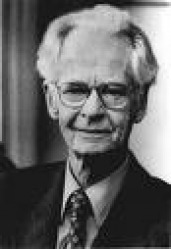B.F. Skinner (1904-1990)
B.F. Skinner, or more properly, Burrhus Frederic Skinner, is one of the most widely known psychologists of the 20th century. He was born in Susquehanna, Pennsylvania on March 20, 1904 to Grace and William Skinner. Growing up, Skinner wanted to be a novelist. In addition to reading a lot, Skinner also spent his time building wagons, roller skates, scooters, gliders, rafts, and even musical instruments. Being skilled at building enabled him to construct many of the devices that he later used in his experiments, such as the widely known "Skinner Box".
When Skinner attended Hamilton College in New York, he majored in English. After meeting Robert Frost, Skinner decided to write his first novel, although soon realized that he had nothing to say. Afterwards, he decided to go to graduate school at Harvard University. While a graduate student, he invented the operant conditioning chamber and cumulative recorder. He also developed an inductive, data-driven method of experimental research. In 1931, Skinner received his Ph.D. in psychology and spent the next 5 years doing research. He then became a lecturer, researcher, and writer at the University of Minnesota, then at Indiana University, and finally at Harvard University.
In 1936, Skinner married Yvonne Blue. They had two daughters, Julie and Deborah.
He later became recognized for his The Behavior of Organisms. This laid the groundwork for his principles of operant conditioning. Then came Walden Two which popularized his idea of an ideal society that was based on scientific principles of human behavior and in which positive techniques of control would predominate. By the 1950s, Skinner became one of the leading proponents of the behavioristic position.
In total, Skinner wrote approximately 200 scholarly books and articles, as well as three autobiographical books totaling more than 1000 pages!
B.F. Skinner was a strong advocate for the idea that the causes of behavior exist outside of the organism. He rejected the commonly held idea of classical conditioning in that he believed that it only explained a limited number of behaviors. Skinner thought that many human responses do not come about from obvious stimuli. He believed that most important behaviors are operant in nature (Lefrancois, 2006).
For more information on B.F. Skinner, check out these helpful websites!
B.F. Skinner Foundation www.bfskinner.org/home.html
The authoritative site for information about B . F. Skinner and the science he initiated.
A Science Odyssey: People and Discoveries www.pbs.org/wgbh/aso/databank/entries/bhskin.html
Home Operant Conditioning Reinforcement and Punishment Positive Behavior Support References

